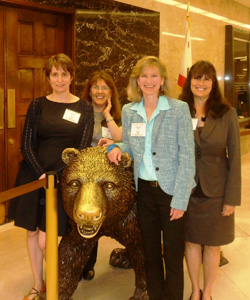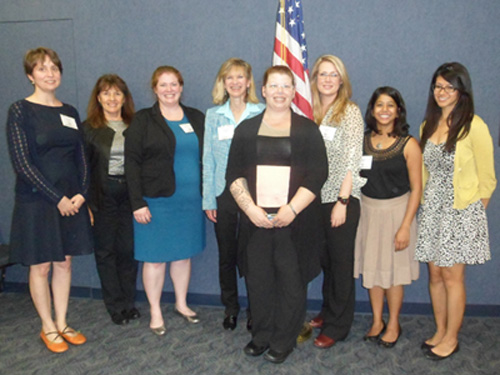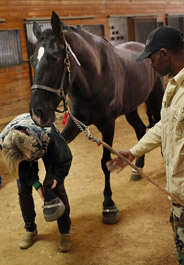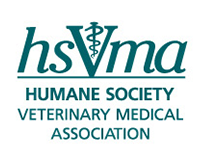|
Advocacy
|
Resolution to the American Veterinary Medical Association's House of Delegates
Submitted by Petition
Regarding the Policy Statement on Pregnant Sow Housing
Resolved that the AVMA supports housing breeding sows in a manner that allows them enough room to stand up, fully turn around and stretch their limbs during their gestation period. To assure this, the sentence "Allow sows to express normal patterns of behavior." should be changed to "Allow sows to express normal patterns of behavior, including being able to stand up, fully turn around and stretch their limbs." in the current policy statement on pregnant sow housing.
This resolution would change the AVMA policy statement on pregnant sow housing to the following (the proposed change in wording is highlighted in red):
AVMA Policy Statement: Pregnant Sow Housing
Pregnant sows are kept in a variety of housing systems. Sow housing and management systems should:
- Provide every animal access to appropriate food and water;
- Promote good air quality and allow proper sanitation;
- Protect sows from environmental extremes;
- Reduce exposure to hazards that result in injuries, pain, or disease;
- Facilitate the observation of individual sows to assess their welfare;
- Allow sows to express normal patterns of behavior, including being able to stand up, fully turn around and stretch their limbs.
There are advantages and disadvantages to any sow housing system. Appropriate training is required for any management system to accommodate the welfare of the sow. Gestation stall systems may minimize aggression and injury, reduce competition, and allow individual feeding and nutritional management, assisting in control of body condition. Stall systems restrict normal behavioral expression. Group housing systems are less restrictive but allow aggressive and competitive behaviors that could be detrimental to individual sows. Genetics and breed selection could promote good sow welfare by matching animals to the appropriate housing system. To address animal welfare in the long term, advantages of current housing systems should be retained while making improvements in design to overcome problems identified.
The AVMA encourages research into housing systems for pregnant sows that improve their welfare.
Read the background information for this petition»
More than 1,000 veterinarians representing all 50 states signed the petition, which HSVMA submitted to the AVMA House of Delegates in May. It is scheduled to be discussed during the July meeting at the annual AVMA Convention. Read more» |
|
Advocacy
|
A “Golden” Opportunity for Animal Advocacy
June 19, 2014
by Barbara Hodges, DVM, MBA, HSVMA Veterinary Advisor
 A few of the HSVMA participants at this year's Humane Lobby Day in California pose with the bear statue just outside Governor Jerry Brown's office. Pam Runquist/HSVMAOn Wednesday, June 11, more than 100 animal advocates from across California gathered at the Capitol in Sacramento for Humane Lobby Day 2014. The annual event, sponsored by The Humane Society of the United States, offers an opportunity for citizens to communicate their support—or their concerns—about pending animal-related bills to their state legislators. Organizations partnering with The HSUS to support this year’s event included HSVMA, the Humane Society Legislative Fund, ASPCA, Animal Legal Defense Fund, Raptors are the Solution, WildCare, the Fund for Animals the SPCAs of Sacramento, San Francisco, Bakersfield, Santa Cruz, and Yolo and the Marin Humane Society.
Among the citizen lobbyists was an HSVMA team that included several veterinary professionals who advocated in our dual roles as constituents and experts on animal health and welfare issues. Joining me on the HSVMA team were Dr. Paula Kislak, President of the HSVMA Board of Directors; Pam Runquist, HSVMA Director of Advocacy/Policy; Erin Luebkeman, HSVMA Student Outreach Coordinator; Dr. Chumkee Aziz, UC Davis Veterinary School Shelter Medicine Resident, and three UC Davis veterinary students: Virginia Butler (Class of 2016), Danielle Duran (2015), and Hai Nguyen (2014); and Elisa Martin, an RVT in private practice. Learn what the participants had to say about the experience»
This year our Lobby Day advocacy was focused on supporting one bill and opposing two others.
- Animal advocates supported Assembly Bill 2657, a bill that would prevent the use of second-generation anti-coagulant rodenticides (SGARs) in environmentally sensitive areas of California. Not only do these rodenticides cause inhumane death of target rodents by intractable bleeding, but also non-target animals, including family pets, and wildlife species such as raptors and mammals—some of whom are rare and endangered—can suffer secondary toxicity and death. This bill has passed the California Assembly and is pending in the Senate Environmental Quality committee.
- We voiced opposition to Assembly Bill 2075, a bill that would continue waiver of a law passed in 1970 prohibiting importation of threatened alligators or crocodiles for commercial uses. A waiver of this law was granted in 2006. AB 2075 would grant another five-year extension. California’s consumers deserve to be able to avoid unwittingly purchasing products made from these endangered animals. This bill passed the California Assembly as well as the Senate Natural Resources and Water Committee. It is pending on the Senate Floor.
- We also opposed Assembly Bill 2268, legislation that would have eased restrictions on sport hunting of wild pigs in California. Although feral pigs are known to damage agricultural lands and wildlife habitat, the bill did not take a rational, cohesive, and humane approach to managing the population. Two days after Humane Lobby Day, the bill’s author, Assemblymember Frank Bigelow, pulled it. It is likely that the opposition to the bill voiced during Humane Lobby Day was instrumental in this turnaround.
The sixth-annual Humane Lobby Day began with a welcome and overview of the day, followed by a panel of experts addressing “Rodenticides: Menace to Rodents, Pets and Wildlife.” This panel provided attendees with additional background information for their support of Assembly Bill 2657.
Attendees then visited the Humane California Fair on the Capitol lawn, where they talked with representatives of various Humane Lobby Day partner organizations, including HSVMA. The afternoon was devoted to meetings by all participants at the offices of their own two Assembly and Senate district members. Our HSVMA team also visited approximately 25 additional Senate and Assembly offices, with a focus placed on lobbying legislators who have historically been less supportive of animal protection legislation. Some of us stayed after the event to talk about our lobbying experiences during a Humane Happy Hour.
California ranks first in animal protection legislation, and we are fortunate to have such an important opportunity to advocate on behalf of the animals in our state every year. We extend a heartfelt “thank you!” to all our veterinary lobby team members, and to those Californians who were unable to attend Humane Lobby Day this year—please join us in 2015!
| If you are interested in participating in a Humane Lobby Day in your state as part of an HSVMA veterinary team, please contact us at [email protected] and we will keep you posted about future lobby days. |

Thank you to the HSVMA team at California's Humane Lobby Day 2014!
Pam Runquist/HSVMA
Feedback from Our HSVMA 2014 Humane Lobby Day Team
Chumkee Aziz, DVM | Shelter Medicine Resident, UC Davis School of Veterinary Medicine
I particularly wanted to participate in Humane Lobby Day 2014, because I wanted to expose our veterinary students to what the role of a veterinarian can be when it comes to animal welfare. We have a professional voice we can contribute to the movement that has the potential to help animals of all kinds, which is what we vow to do when we become veterinarians. Thank you for inviting us to this event. It was inspiring to see people from varying backgrounds come together for a cause that is so fundamental, to ensure that all animals are protected from unneeded suffering.
Virginia Butler, JD | UC Davis Veterinary Student and Legislative Liaison, Class of 2016
As veterinary students and professionals, it is important to look further than our hands when it comes to the health and welfare of animals and to use our voices as well. Participating in Humane Lobby Day made me realize that you don’t have to be a professional lobbyist to be on the front lines of legislative change – you just have to be passionate and willing to voice your opinion to your representatives. And as professionals with expertise in animal health and welfare, our voices can be very persuasive.
Paula Kislak, DVM | President, HSVMA Board of Directors
Every year, working in concert with our HSVMA lobbying team, I am reminded of how powerfully our individual voices are amplified when advocating together. Each team member echoes our positions on the issues in their own unique manner—and this deepens and reinforces our messages to the decision-makers at the Capitol. Lobbying against a bad bill can be just as important as lobbying in support of a good one. On animal-related bills, legislators and staff really do listen and greatly appreciate our professional perspectives.
Elisa Martin, RVT | San Francisco SPCA and Pet Emergency and Specialty Center of Marin
I appreciate that HSUS and HSVMA made it possible for me to speak on behalf of animals who cannot speak for themselves. I had a great time during Humane Lobby Day and I would encourage everyone to participate. I will plan on lobbying again next year.
|
|
|
Advocacy
|
Veterinary Hospice
Compassionate Clinical Care Whose Time Has Come
Part 2 of 2
Colorado State University was the pioneer of academic veterinary hospices.6 CSU Pet Hospice was developed in 2003 and, unlike MSU VHC, it is a student volunteer-run program that trains veterinary students in animal hospice care, and matches them with the family and the veterinarian of a terminally-ill pet in the community. In the first five years of this program, 101 veterinary student volunteers provided support to 68 families.
Comparatively, in just over two years, VHC has provided care to 133 patients and their families. There have been as many as 18 active hospice patients on our census at one time. It has been suggested that the reason for higher VHC acceptance within the MSU community is the presence of a veterinarian leading the care, rather than students. While it is undeniable that veterinary students are the future, our program’s establishment was benefited by the credibility of a board-certified veterinarian. Another possible reason is that pet hospice has now been elevated to the mainstream. And as already proven in human medicine, as the public learns more about the hospice option, they are more apt to make use of it.
Similar to human hospice, the majority of VHC patients have been diagnosed with cancer, although most have multiple concurrent debilitating conditions. As the service has progressed, there has been a noticeable change in the patient trajectory—earlier referrals have resulted in longer patient time in hospice care. Similarly, families that have previously experienced hospice care are coming back seeking hospice care for their other pets.
Unlike human hospice, patients receiving care from VHC can concurrently be under the care of specialist or primary care veterinarians for therapeutic treatment of their illnesses. Since the time between terminal diagnosis and death is often shorter for animals than it is for people, families can choose to enroll their pets early in the disease process. This assures that comfort is maintained throughout the remainder of the patient’s life, and support is provided for the family. In order to ensure good communication, VHC provides a medical record that is shared with all members of the pet’s health care team, including the owner.
While I practice traditional Western medicine focused on palliation of symptoms and aggressive, proactive analgesia, alternative therapies (including acupuncture) are offered through referral to two colleagues in the MSU CVM community—Lori Bidwell DVM, DACVA, CVA, and Elizabeth Carr DVM, PhD, DACVIM, DACVECC, CVA. Human mental health care is also provided through referral to the MSU Veterinary Social Work Service, headed by Linda Lawrence MSW, LMSW. Together with Linda Lawrence, I co-facilitate the MSU Companion Animal Loss Support Group. Established in 2006, this group adds another layer of support for owners facing their pets’ deaths. Although I am not a human health care provider, my medical expertise is often useful within the context of the support group, as it is essential for the bereaved to understand the ramifications of the diseases faced by their animals.
MSU CVM has supported our mission to elevate the importance of end of life care by increasing veterinary student training. Since the establishment of VHC, I have been teaching four hours in core curricular classes on subjects including the legal ramifications of euthanasia, practices of euthanasia and end of life care delivery, and ethics surrounding the end of life. This amount of end of life care exposure raises the bar in the academic veterinary community, as most schools average only one hour (within the four-year program); this single hour is typically focused on euthanasia and accompanying legal considerations.7 At present, MSU veterinary students are not able to participate in the in-home care and plan development for active hospice patients. The goal within the next 1-3 years is that students will be offered an elective in end of life care, and will then be able to take on a more active role with hospice patients.
Community outreach is provided in the form of numerous lectures on end of life care topics for local veterinary medical associations and other organizations throughout the state. Data is currently being collected for an observational research project. Future areas of research interest include management of canine cognitive dysfunction and drug research for specific diseases.
I’ve also been instrumental in the establishment of the Veterinary Society for Hospice and Palliative Care, along with co-founder Katherine Goldberg, DVM. This organization aims to bring academic rigor to the discipline of hospice and palliative medicine within the veterinary profession, as well as progressive, evidence-based training to veterinarians interested in providing this care. While in its infancy, one of our major organizational goals is the establishment of a residency training program within a veterinary academic institution.
Veterinary Hospice Care continues to grow and become more widely accepted within the community and public eye. The public has responded favorably, offering donations to VHC to ensure that it continues. In the future, I hope our MSU VHC Service will be able to develop an elective course in end of life care, as well as engage students in the clinical care of active hospice patients.
« 1 2
| Join us April 15, 2015 for a webinar on end-of-life care presented by Dr. Yaxley. Learn more» |
 Page Yaxley, DVM, Diplomate of the American College of Veterinary Emergency and Critical Care, is the founder and director of Veterinary Hospice Care at the Michigan State University College of Veterinary Medicine. Dr. Yaxley graduated from The Ohio State University and completed an internship at Michigan Veterinary Specialists. She then completed a specialty internship, followed by a residency in Emergency and Critical Care Medicine at Michigan State University. In the fall of 2013, along with Dr. Katherine Goldberg, Dr. Yaxley founded the Veterinary Society for Hospice and Palliative Care—the first organization dedicated solely to the hospice veterinarian, with the long-term goal of initiating a recognized board certification program within this discipline. Dr. Yaxley is also co-facilitator of the Companion Animal Loss Support Group, established at MSU in 2006. Her primary interest is the human-animal bond, linking both her critical care foundation and her establishment of the country’s second veterinary hospice affiliated with a teaching institution. In her spare time, Dr. Yaxley volunteers at Sparrow Hospice House in Lansing, Mich., and she is currently training a pet therapy dog named "Tucker."
REFERENCES
- McNicholas, et al. Ownership and human health: a brief review of evidence and issues. Brit Med J 2005. 33:1252-1254.
- Voith VL. The impact of companion animal problems on society and the role of the veterinarian. Vet Clin Small Anim 2009.39:327-345.
- Brown JP, et al. The current and future market for veterinarians and veterinary medical services in the US. JAVMA 1999.215:161-183.
- American Medical News. American Medical Association. 2009. www.amednews.com
- Billings ME, Curtis R, Engleberg RA. Medicine residents’ self-perceived competence in end of life care. Academic Medicine 2009.84(11):1533-1539.
- Bishop GA, Long CC, Carlsten KS, Kennedy KC, Shaw JR. The Colorado state university pet hospice program: end-of-life care for pets and their families. J Vet Med Educ. 2008 Winter;35(4):525-31.
- Rowan AN. The human animal bond in academic veterinary medicine. JVME 2008.35(4):477-482.
|
|
Advocacy
|
Federal Animal Welfare and Veterinary Practice Legislation Progresses
May 26, 2014
 Dr. Angie Lingl examines a horse for evidence of soring at the stables of well-known Tennessee walking horse trainer Jackie McConnell. The investigation led to felony criminal indictments for violations of the federal Horse Protection Act. Lance Murphey for The HSUSIn November, we profiled three pieces of federal legislation that would impact the welfare of equines and other species and would affect practice parameters for mobile and ambulatory veterinarians. Two bills have moved forward, and we encourage HSVMA members to join us in supporting their passage. One measure has been dropped—a positive step because it was not drafted with the best interests of animals in mind.
Prevent All Soring Tactics Act
The Prevent All Soring Tactics (PAST) Act (S. 1406/H.R. 1518) would protect Tennessee Walking horses, Racking horses, and Spotted Saddle horses from the cruel and inhumane practice of "soring," the intentional infliction of pain to horses’ hooves and legs by unscrupulous trainers in order to gain unfair competitive advantage in the horse show ring by performing an exaggerated gait called the "Big Lick." The PAST Act would also strengthen the Horse Protection Act of 1970 by banning action devices and stacked shoes associated with soring, increasing penalties for violations, and ending industry self-policing, a practice which has proven to be ineffective.
The PAST Act is endorsed by all 50 state veterinary medical associations, the AVMA, AAEP, AHC, HSVMA, horse industry professionals, and numerous animal protection organizations. The bill currently has 279 co-sponsors in the House of Representatives and 54 co-sponsors in the Senate. The bill was approved by the Senate Commerce, Science and Transportation Committee in April and is now waiting to go to the Senate for a full vote.
The Veterinary Medicine Mobility Act
The Veterinary Medicine Mobility Act (VMMA) (S. 950/H.R. 1528) would allow licensed veterinarians to transport and dispense controlled substances outside their registered locations in order to treat animal patients in the course of providing mobile or ambulatory medical services. Passage is essential for veterinarians practicing under field conditions, conducting house calls or mobile spay/neuter clinics, and in some agricultural and/or wildlife scenarios.
All 50 state veterinary medical associations have endorsed the bill, and HSVMA submitted a statement in support of it. We also joined a coalition of 130 organizations advocating for passage. In January, the Senate unanimously passed its version of the VMMA, and in April the House Energy and Commerce Committee unanimously approved identical language. There are 186 co-sponsors of the bill in the House. The bill is currently awaiting floor time in the House, and if passed will be on its way to President Obama for his signature.
| Join HSVMA by adding your individual voice in support of the PAST Act and the VMMA—contact your federal legislators and express your support for these bills as both a constituent and a veterinary professional. Veterinary voices will be crucial to passage of both these important pieces of animal welfare legislation. |
King Amendment Dropped
We were relieved to learn that the final version of the FARM (Federal Agricultural Reform and Risk Management) Bill, which was signed into law February 7 this year, omitted the harmful King amendment. Proposed by Rep. Steve King of Iowa, the amendment threatened to erase many state laws concerning puppy mills, horse slaughter, food labeling and more. The King amendment would also have limited the ability of states to determine how best to protect their citizens and animals. HSVMA submitted an organizational letter opposing the amendment in August. |
|




